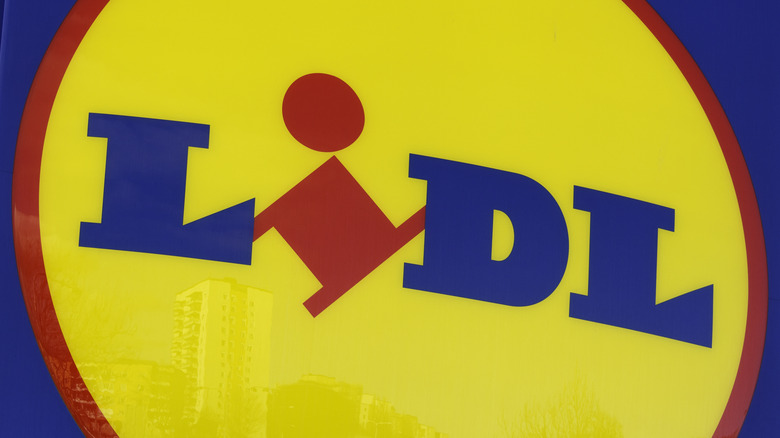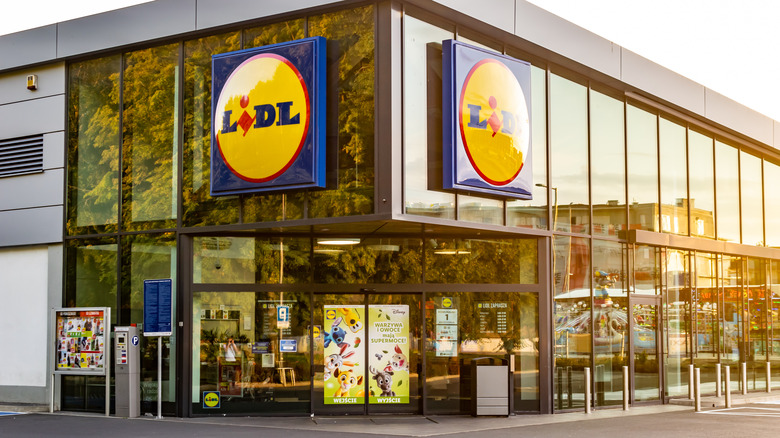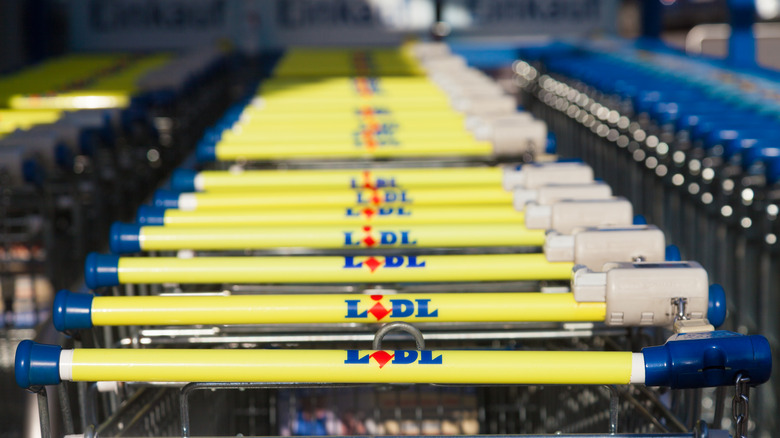What Is Lidl And Is It Related To Aldi?
If you've never been inside a Lidl (but maybe walked by one in a shopping center), you might think it's a toy store or even an alternate-universe Scandinavian furniture store, given its playful primary-colored logo. But it's actually a discount grocery store with a homely European warehouse aesthetic, not unlike Lidl's top competitor, Aldi. Both Lidl and Aldi are German-owned discount supermarkets, but — despite what many people believe — the two retailers are not related.
There are quite a few differences between Lidl and Aldi, which go beyond corporate ownership. For starters, Aldi has a much stronger foothold in the U.S., with over 2,300 locations nationally — and a projected 3,000 by 2028. Aldi is older than Lidl by some decades. The original Aldi began in 1913 as a mom-and-pop shop (literally, the Albrecht brothers who grew the franchise into a multi-billion monolith was first opened by their parents) and is now one of the most popular grocery chains in the world.
Big Lidl lies
Lidl's origins are in 1930s Germany, but its founder, Josef Schwarz, didn't jump into discounted groceries immediately. Schwarz dabbled in wholesale fruit, but when WWII came around, his plans — like just about everything else in Germany at the time — were derailed. It wasn't until 1973 that Schwarz opened the first Lidl store, and since his son, Dieter, took over in 1977, the company has amassed a multi-billion dollar fortune. While Lidl is wildly popular in Europe, it's pretty new to the U.S. The first domestic Lidl opened in 2017, so it remains to be seen if Lidl will pose any real competition to Aldi.
Truth be told, Lidl has been a bit shady in business; in fact, the list of its offenses is quite embarrassing. Lidl has historically discouraged its workers from attempting to unionize, and in 2008, it was discovered that the company was keeping detailed documentation of employees' personal matters, including health conditions and romantic relationships. To be fair, Aldi isn't free from controversy either, with its horse meat scandal in 2013 to its alleged wage theft. But it's safe to say that at least two things that Aldi and Lidl have in common are ruling-class corruption and reasonably-priced fruit.
The more you know
It's a common misconception that Lidl and Aldi are owned by the same company — but they're not, they're both simply German. The reason folks might make this mistake is that Aldi — well, Aldi Nord –owns Trader Joe's. But you may be asking yourself, what is Aldi Nord?
Here's the deal: Aldi was split into two corporations after the Albrecht brothers couldn't agree on the sale of cigarettes at their jointly-owned Aldi. In response Theo and Karl split the company in the 1960s into Aldi Nord (north) and Aldi Sud (south). Both companies operate in the U.S., but Aldi Nord owns Trader Joe's. Aldi Sud, in turn, owns what American's generally think of as Aldi in the U.S.
Lidl is affordable and innovative, if not sometimes problematic. If you're looking for a grocery store that won't break you financially, stocks high-quality food, and embraces environmentally sustainable practices, then you might give Lidl a chance — that is if you can find one nearby. If so, at least it'll give you a break from having to fuss with the change machine just to rent a shopping cart at Aldi.


